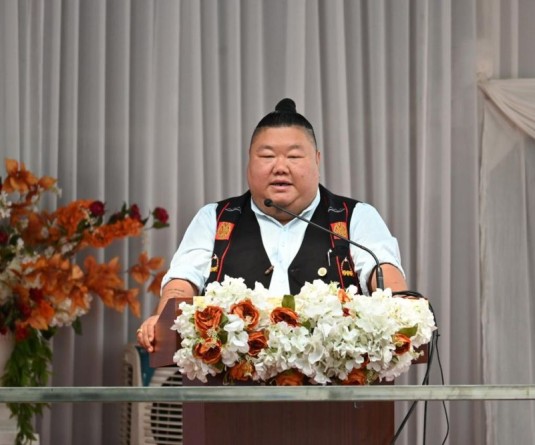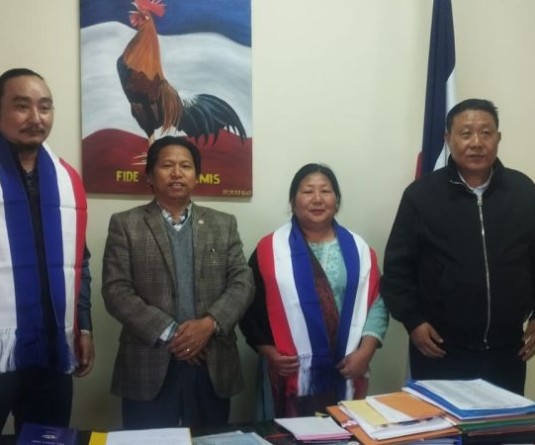
Our Correspondent
Kohima | October 1
Minister for Urban Development, Higher & Technical Education Dr. Shürhozelie Liezietsu today stressed on the need to put concerted effort and contribute in building better cities and creating more opportunities for ourselves and for future generations.
“To fully reap the opportunities of urbanization, concerted effort from all stakeholders is crucial because our towns and cities require the kind of policies,” Dr. Liezietsu told the World Habitat Day here today organized by Kohima Municipal Council (KMC) under the theme “Changing cities, building opportunities.”
Stating that it also requires efficient manager, increased investment, dedicated urban professionals and expertise, citizen participation and the cooperation of land owners, he said only then we can build high class competitive cities with sustainable infrastructure to boost the prospect for economic development. The minister stated that Nagaland is at the acceleration stage of the process of urbanization. The state has recorded the highest rate of urbanization in India during the last two decadal censuses 2001 and 2011.
During 2001 while the average rate of urbanization at the National level was about 22%, Nagaland recorded 68%. Similarly during 2011, Nagaland recorded 69% against the national level of 21%. “Such high rate of urbanization were due to various factors such as migration from rural to urban areas, natural growth of urban population and inclusion of new urban areas as statutory towns,” he said adding that at this rate, the urban population will overtake the rural population in the future. “This is evident in the fact that the rural areas have recorded a negative growth rate during the census 2011, whereas the urban areas recorded 69%. Hence, the urgent need to focus on the issues and problems of the urban areas.”
Stating that Nagaland is strategically placed in the context of the “Look East Policy’ adopted by the Government of India, the minister said the need for development of state-of-the-art infrastructure in the cities of Kohima and Dimapur assumes greater importance. Under the ‘Look East Policy’, he said the Land Trade Routes with the Far Eastern Countries are being opened for an ever growing trade with India. For such a growth, Dimapur can be very well serve as the nearest rail head (From the Myanmar border) for freighting goods to the rest of the country. It can also become the launching pad for all economic activities.
In this context, he said it is crucial for all stakeholders to engage in serious efforts to facilitate the growth and development of the towns. “Availability of basic sustainable infrastructure such as adequate housing, drinking water supply, proper drainage, street lighting, effective and eco-friendly waste disposal mechanism, sewerage, efficient traffic and transport system, public amenities are critical in attracting and facilitating investors in this part of the region,” the minister said.
Also stating that our towns and cities are changing rapidly due to the fast pace of urbanization, the minister however said the ensuing growth is haphazard and chaotic for various complex reasons. Space constraints, improper land usage, dearth of planned and coordinated development coupled with lack of civic sense are pushing our towns towards imminent crisis. “Availability of sufficient land in our urban areas is crucial to achieving properly planned towns and cities. But this has become a major bottleneck in the planning process,” he said.
Dr. Liezietsu said the condition of towns and cities reflect the will and aspiration of its citizens. If reflects the vision and commitment of the policy makers, management of capacities of the concerned local bodies and most importantly the civic sense of its citizens. In this, he said the management of our towns and cities require collective effort from all stakeholders such as the policy makers, the urban local bodies, citizens, professional and experts in the area of urban development, adding “We can no more afford to perceive urban development in a piecemeal approach, but in a holistic and comprehensive manner.”
Stating that cities are here to stay, he said that there is no question of abandoning towns and cities, adding the “process of urbanization is an irreversible process and, therefore, it is important to streamline the process of urbanization in a desired direction of growth. Unless our towns grow and prosper, we can neither growth nor prosper.”
Earlier, keynote address was delivered by L. M. Yanthan, regional chief HUDCO. Two topic experts G.T. Thong, department of Geology, Nagaland University and Dr. Vizovol Mekro, Associate Professor Kohima Science College Jotsoma also spoke on the occasion. The programme was chaired by Elizabeth Ngully, Chief Executive Officer KMC while welcome address was delivered by Asangba Chuba Ao, IAS, Additional Secretary UDD. Zanbemo Ngullie, Joint Director SUDA proposed vote of thanks.





